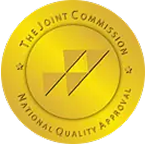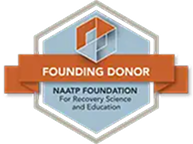The Second “C” Explained: Why You Can’t Control Someone Else’s Addiction

You check their room for the third time today. You’ve hidden the car keys, changed the WiFi password, and moved money to an account they can’t access. At 2 am, you lie awake listening for footsteps, wondering if they’ll come home safe tonight — or at all.
You’re not a bad parent, spouse, or sibling. You’re exhausted and desperate, drowning in love and fear. You’ve tried everything you can think of to keep them from going off the cliff, but their addiction has only gotten worse.
Your story echoes across America, in countless homes affected by addiction. It’s a heartbreaking truth many families face: Love isn’t enough, and control is an illusion.
At Fellowship Hall, we’ve walked beside thousands of families over the past 50 years. And for anyone who has ever lived in your shoes, there is a path to peace of mind. It begins with the 3 Cs from the Al Anon Big Book:
- You didn’t cause it
- You can’t control it
- You can’t cure it
Let’s explore the second C — perhaps the hardest to accept, and the most transformative: You can’t control it.
The Control Illusion
When someone we love is losing the battle of addiction, we instinctively try to help. But when our desperate need to help turns into control, we enter dangerous territory.
You try to monitor everything: phones, whereabouts, bank accounts. You manage their finances, make excuses to employers, hide triggers. At first, it seems to work—they sober up for a few days, agree to treatment under pressure. And these small victories fuel the belief that if you just try harder, you’ll find the magic fix.
But addiction escalates. And so does your effort to stay ahead of it.
Over time, your life becomes consumed by surveillance and stress. You’re hypervigilant. You resent not just the addiction, but them. The harder you try to control it, the more out of control you feel. This is how addiction affects families — it distorts roles, drains joy, and rewires relationships.
“You are not responsible for making other people ‘see the light.’ You are responsible for helping yourself see the light.” — Melody Beattie in The Language of Letting Go
Addiction Is a Disease
At Al Anon meetings, you’ll hear this again and again: addiction is a disease, not a moral failure. But most people struggle to understand how this truth can be.
When someone uses substances repeatedly, their brain chemistry fundamentally changes. Drugs and alcohol hijack the reward system — the same system that makes you feel good when you laugh or hug someone you love. Over time, the brain produces less natural “feel-good” chemicals, creating a deficit only the substance can fill. This isn’t a character flaw; it’s biology.
Genetics also play a role. According to the National Institute on Drug Abuse (NIDA), genetics account for 40-60% of a person’s risk for developing addiction. Let that sink in. 40-60% arrive here on earth with the predisposition for addiction. Trauma, stress, and mental health issues can trigger this genetic predisposition and increase the odds of addiction.
If you’re one of many adult children of alcoholics, you already know it runs in families.
Addiction doesn’t mean your loved one is bad. It means they’re sick — and need help from trained professionals, not loved ones playing the role of detective, therapist, and parole officer all at once.
No one asks a family to treat diabetes or cancer at home. Yet many families try to manage addiction solo. That’s where support groups for families of addicts—like Al-Anon, Nar-Anon, and others recognized by the American Medical Association or the National Institute on Drug Abuse —make all the difference.
The Cost of Control
Trying to control someone else’s addiction is emotionally and physically devastating.
For families, mental health often deteriorates first: anxiety, depression, sleep deprivation. Your identity begins to dissolve, your self-care vanishes, and your relationships suffer.
For your loved one, control tactics backfire. Monitoring leads to lies, not sobriety. Resentment builds. The relationship becomes transactional — less love, more strategy.
For the family system, the fallout is long-lasting. According to recent research, it’s clear: Entire households reorganize when addiction comes through the door. Roles become distorted: some become enablers, others peacekeepers, others disappear. Children may take on adult roles — or disappear emotionally.
The family stops functioning as a healthy unit and becomes a treatment facility run by untrained staff — exhausted, overwhelmed, and increasingly dysfunctional. These dynamics ripple across generations.
Understanding how addiction affects families is key to changing how we respond when addiction surfaces in our own family.
Learning to Let Go
Letting go doesn’t mean giving up. It means stepping back so your loved one can take responsibility for their recovery. So how does a parent or a loved one do that?
Letting go begins with grief. Grieving the belief that if you just tried harder, loved deeper, you could save them. You move through denial, anger, bargaining, sadness — before finally landing in acceptance.
In the 12 Steps of Al Anon, Step 1 asks us to admit our powerlessness over addiction. That step is radical — and freeing. You stop trying to fix someone else and start tending to yourself.
At Al Anon meetings, families learn that real help doesn’t look like rescuing. It looks like setting boundaries, holding space, and choosing peace over chaos. It’s the only sustainable path to healing — for you, and possibly for them.
What Healthy Support Looks Like
So, if control doesn’t work, how do you help someone with addiction? By becoming a supporter, not a manager. Healthy support strategies you can choose instead?
- Being present without trying to fix or make it better
- Offering resources like treatment options without forcing them
- Encouraging autonomy in their recovery decisions
- Celebrating small victories — without taking credit
- Setting clear boundaries with love
Boundaries are not ultimatums. They’re self-respect in action. Dysfunctional families dealing with addiction will need the following common “self-respects”:
- Financial boundaries – No loans or covering up consequences
- Behavioral boundaries – Not tolerating use in your home
- Communication boundaries – Choosing when and how you engage
- Consequence boundaries – Allowing them to face outcomes of their actions
Sometimes, yes, you do need to intervene — when safety is at risk, illegal activity is involved, or in a medical crisis. That’s when professional intervention becomes necessary. But day-to-day control? That’s different. That’s about your peace.
Redefining Your Role
As hard as it seems to accept, there is freedom when you take off that manager uniform and choose the supporter hat instead.
As a supporter, you are no longer trying to drive the train. Fear doesn’t fuel your choices. Love does. You support recovery, but you don’t control it. You get your life back. You sleep. You smile again. You go to meetings, reconnect with friends, maybe even laugh.
You learn that your healing doesn’t depend on theirs. That is a core message in family support in addiction recovery. It’s what allows families to rebuild, even if their loved one is still struggling.
Especially for adult children of alcoholics, this truth is life changing. You no longer feel responsible for fixing everyone else. You learn to focus on what you can control — your own well-being.
The Paradox of Letting Go
Here’s the counterintuitive truth: letting go of control often brings families closer to peace — and to their loved one.
“Detachment with love” isn’t cold or cruel. It’s a deep form of compassion rooted in respect and boundaries. It’s stepping back so healing has space to begin. It’s the heart of Al-Anon wisdom.
The AA Big Book and countless stories from Fellowship Hall prove that recovery is possible — but it has to be their choice. Often, the best thing families can do is step back and trust that their loved one has the strength to choose recovery on their own.
You can’t make someone get sober. But you can model self-respect, seek support, and create a home that values honesty, safety, and love.
Letting go is not weakness — it’s courage. It’s love with open hands.
Take one small step today. Attend an Al-Anon meeting. Read the AA Big Book. Visit Fellowship Hall to learn about their resources for families. Write down the 3 Cs and tape them to your fridge. Begin to live by the truth you’ve already sensed in your heart: You didn’t cause it. You can’t control it. You can’t cure it. But you can choose peace.
"*" indicates required fields
CONNECT WITH US
Our Admissions Staff Is Here to Help
Not sure if you or someone you love needs help? Call our Admissions Staff who can help you assess the next step at 336-553-6596."*" indicates required fields






